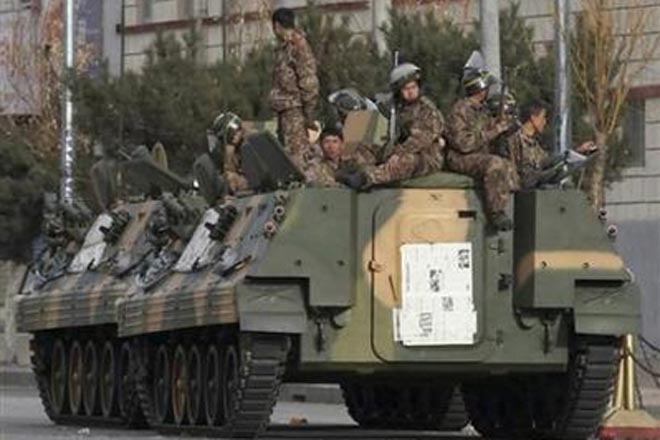Armoured vehicles and trucks carrying thousands of Chinese troops rumbled through riot-damaged streets of the regional capital of northwestern Xinjiang on Thursday, blaring out propaganda urging ethnic unity, Reuters reported.
But some residents of Urumqi, where 156 people were killed and 1,080 wounded on Sunday when minority Muslim Uighurs went on the rampage against Han Chinese, worried about how the two sides could ever co-exist again.
Beijing cannot afford to lose its grip on Xinjiang, a vast desert territory that borders Russia, Mongolia, Kazakhstan, Kyrgyzstan, Tajikistan, Afghanistan, Pakistan and India, has abundant oil reserves and is China's largest natural gas-producing region.
"This whole thing may go on for a few days, but eventually the government has to use force, there's no question about that," said Bo Zhiyue, senior research fellow and China politics expert at National University of Singapore's East Asian Institute.
"Because if you don't use force, the whole thing will snowball. It would spin out of control. Any government would have to do something about it."
Han Chinese, who have said they feel threatened after Sunday's violence, cheered Thursday's show of military might and took pictures. Uighur residents looked on with strained faces.
"This makes me scared and I think it's meant to," said a Uighur woman called Adila. "What can we do against so many soldiers?"
Authorities have posted notices urging rioters to turn themselves in or face stern punishment. Li Zhi, Communist Party boss of Urumqi, said he would seek the death penalty for rioters who resorted to "cruel means" and murdered people in this city divided between Uighurs and Han, the country's predominant ethnic group.
The notices, posted on walls in the Chinese and Uighur languages, say that those who hide or protect "criminals" will also be punished. The death penalty is common in China, even for economic crimes.
The line of troops, armoured vehicles and trucks measuring several kilometres and blasting out the propaganda passed for about 25 minutes through Saimachang, the Uighur neighbourhood where hundreds of women protested on Tuesday.
Helicopters flying only a few metres above rooftops scattered propaganda leaflets over the crowd of hundreds who gathered to watch the security forces march by.
Troops mounted on the truck with guns and riot shields shouted slogans in unison and some of the trucks carried signs in Chinese, one of which read "separatists bring calamity to the country and its people".
The Uighur woman, Adila, said her husband had been taken away on Monday by police although he had just arrived back from the city of Yili in Xinjiang where he works as a truck driver.
"He works for a Han man, but I'm not sure we can work with Han people now. They hate us, and we are scared of them."
The violence prompted President Hu Jintao to abandon a G8 summit in Italy and he returned home to monitor developments in Xinjiang where hundreds have been arrested in the ensuing crackdown. Financial markets have been unaffected.
Sunday's rioters were mostly from the southern part of Xinjiang, the English-language China Daily quoted Adina, the wife of a neurosurgeon at the regional People's Hospital, as saying.
"They had different accents, wore different clothes, and beat up even Uighur girls who wore short sleeves (for violating fundamentalist customs)," Adina added.
Shi Guanzheng, a retired teacher originally from Shanghai, dared not venture too far despite the heavy security presence.
Shi blamed the government for failing to quell protests by Han on Tuesday, when, armed with knives, clubs and bars, they thronged parts of the city demanding revenge against Uighurs.
"That should never have happened. It should have been nipped in the bud. The killings of innocent people is never justified, but now both sides are so filled with emotion that the repercussions will last a long time," he said.
"I'm scared about what will happen when the (paramilitary) People's Armed Police have to leave. It's not about tomorrow or the next day. It's about next month or after. What then?"
Xinjiang has long been a tightly controlled hotbed of ethnic tension, fostered by an economic gap between Uighurs and Han, government curbs on religion and culture and an influx of migrants who are now the majority in Urumqi.






